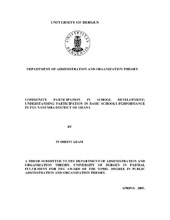Community participation in school development: Understanding participation in basic school performance in the Nanumba district of Ghana
Master thesis

View/
Date
2005Metadata
Show full item recordCollections
- Department of Government [457]
Abstract
This study has been an attempt to look at the impact of community participation on the performance of basic schools in Ghana, specifically the Nanumba District of the Northern Region. As a government policy under the decentralisation concept and the FCUBE, communities are required to take part in the development of schools their children attend.The study examined the forms and level of participation in two basic schools in the district and its influence on the performance of the schools. It is, therefore, a comparative study. This aimed at ensuring our understanding of local participation in government policies. Qualitative data were employed in the study. The study also adopted the Case study Strategy of doing social research. General theories of participation especially as it relates to local or grassroots were used to explain the phenomenon. However, the study has been largely guided by the Communitarian model of participation as well as the articles by Patrick Watt, Bray, Uemura and others.The main conclusion reached in the study is that school performance or development cannot be explained by community participation alone as other variables come into play in explaining performance. This is because it is difficult to disentangle participation from community profile which to a large extent determines participation; the study found. However, where participation is active, performance would be better. Also, the study found that participation and the forms it takes depend on a number of factors; and that performance and participation are like a double-edged saw. They cut on both sides. That is they influence each other and depend on each other.The study also reached the conclusion that in assigning education provision and delivery roles to communities, the issue of equity risks be taken into account. For rich, well resourced and willing communities have the potential of ensuring effective performance of schools. This can result in disparity in the rate of development of schools.
Publisher
The University of BergenCopyright
The authorCopyright the author. All rights reserved